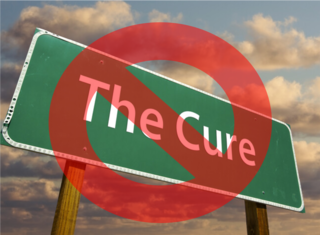OCD
The Unintended Consequences of Saying OCD Can Be Cured
People can feel demoralized and unmotivated.
Posted July 5, 2019 Reviewed by Abigail Fagan
Every now and then the concept that OCD can be cured resurfaces somewhere in the media. As a person with lifelong OCD and as a therapist specializing in the treatment of the disorder, I’d like to share some thoughts about why talking about a “cure” could have negative unintended consequences for people who have OCD and how to have more realistic expectations of recovery.
Disorder not disease
When I think of the term “cure” I think of diseases that are cured by eradicating whatever organism or issue is causing the problem. For instance, people will take medication to kill disease-causing bacteria or have surgery to remove diseased tissue. People are then “cured” because the source of the problem is gone.

But OCD is a disorder, not a disease. We don’t exactly know what’s happening biologically in the brain to cause or maintain OCD, so we can’t “fix” it. We can change the way the brain operates through medication and/or exposure and response prevention therapy (ERP), but those changes don’t cure the disorder: they instead help the brain function in a less disordered way.
Is a cure impossible?
Are there people out there who had OCD in the past and are now experiencing absolutely no symptoms? Yes, there seem to be, and this is wonderful! It’s just not very common in my experience. But I’ll hypothesize from my own experience in working with people who have OCD about the situations that might be more likely than others to lead to this outcome:
- The person had OCD as a child and was treated with exposure and response prevention therapy quickly after onset. This situation doesn’t happen frequently, unfortunately, because it can take people with OCD more than a decade to find the right treatment.
- The person had OCD that was about only one thing, did exposure therapy and has experienced few or no flares since. This situation also doesn’t happen frequently, because it’s unusual in my experience for OCD to be only focused on one particular type of content or worry. Normally people with OCD have multiple situations or contexts that will trigger episodes.
- The person had OCD, did ERP therapy, and since doing therapy has perfectly addressed every intrusive thought by never doing compulsions.
Let me address this last situation. Your first thought may be, “No compulsions—awesome! This person is doing a fantastic job implementing what they learned in therapy!” And yes, they are and that’s awesome. But it’s also unrealistic.
As I discussed in my post “Why There’s No Cure for OCD: But you can have an amazing, joyful life anyway!,” OCD isn’t the presence of intrusive thoughts. OCD is instead the negative reaction to those intrusive thoughts. And the reaction is really two-fold: your OCD reacts negatively to an intrusive thought by interpreting it as being dangerous and as a result, you feel anxious. Then, YOU may react to OCD’s reaction with a compulsion, where you do something mental or physical to reduce your anxiety. And that’s how you get stuck in the endless OCD loop.
Now, you might think, “Well, you CAN help getting stuck. You can choose to not do a compulsion.” Yes, not doing compulsions is the goal because that breaks the OCD loop. And not ever doing a compulsion would be ideal, but we don’t live in an ideal world. We live in the real world where no one is perfect. No one addresses their OCD perfectly all the time. I certainly don’t. In fact, I wrote a whole blog post called “I’m an ERP Therapist and I Don’t Do ERP Perfectly” because I do not want people with OCD to think they have to do therapy perfectly, because that’s impossible. And if you are trying to do something impossible, you’re setting yourself up for disappointment.
This is why saying OCD can be “cured” can have some negative unintended consequences.
The self-critical shame trap
If we tell people that OCD can be cured, the implication (especially for people who tend to see things in more "black and white" terms, which is typical of OCD) is that it’s possible to eradicate OCD and therefore not have any OCD symptoms. A score of 0 - 7 on the Yale-Brown Obsessive Compulsive Scale is considered subclinical, and if I took the Y-BOCS on most days, that’s where my score would fall.
But every now and then, maybe once or twice a year, I’d score in the 20s, which is moderate or severe, depending on the number. For instance, there was the time a bat ran into me, triggering both real and OCD fears about rabies (see Is Fred in the Refrigerator? Taming OCD and Reclaiming My Life if you want to know how that one went). More recently, a few months ago I was incredibly sleep-deprived due to dealing with some minor medical issues. During this time, my OCD got triggered and freaked out, and I was fatigued enough that I listened to it: I did a bunch of compulsions and was sucked into the OCD vortex.
Now, was that my fault? Technically, sure. I chose to do compulsions. But did I think about it that way, blaming myself for my own misery? Absolutely not. I was self-compassionate. I said, “Of course I did some compulsions. I was exhausted! It’s ok, no one’s perfect. I’m just going to do the best I can going forward to act like what OCD is saying is irrelevant, and eventually I’ll pull myself out of this.” And I did. I didn’t enjoy it, I wish it hadn’t suffered as much as I did, but I used it as an opportunity to get stronger.
As I’ve written in previous posts, people with OCD tend to be incredibly self-critical. Self-loathing is also a common problem. That’s why realistic expectations of recovery are so important for the well-being of people with OCD. Because if people with OCD have unrealistic expectations they cannot achieve, they are incredibly likely to beat themselves up, which hurts them and their recoveries. If my expectation is that I should be “cured” from my OCD, my time in the 20s on the Y-BOCS would likely lead to a self-loathing shame fest: “What is wrong with me?! I shouldn’t be having any symptoms! OCD is curable, so I must be a failure. I wasn’t strong enough to not do compulsions so my relapse is my own fault! Why can other people get better and I can’t?”
In my self-loathing diatribe, I’m unknowingly using OCD’s language, shame and fear, to motivate myself to “get it together!” because my expectation from hearing that there’s a cure is that I shouldn’t be having any symptoms. What’s worse, if I’m engaging in this kind of self-talk because of faulty expectations, I’m talking to myself just like my OCD talks to me, making it more likely, not less, that I’ll have the very lapses that I think I shouldn’t be having!
“In recovery” vs. “cured”
I have met hundreds of people with OCD through being a therapist, doing OCD advocacy work, and running support groups for people who both have and treat OCD. Of all these folks, I know of only one person who considers themselves “cured,” and I’ve read about one other (whom I don’t know). So it’s possible for some, but probably not likely for most.
But shouldn’t we aim for being “cured” because that’s the best outcome? We could, but then I think about what Click and Clack from NPR’s Car Talk used to say: Happiness equals reality minus expectations. If your expectations are that you should be able to get to the point where you don’t have OCD symptoms, and you’re like most people and don’t achieve that, you’re going to be pretty disappointed in ERP, your therapist, yourself, and even life, for having dealt you such a crummy hand.
But what if your expectations for being in recovery are less lofty, such as that after doing ERP therapy...
- OCD will likely occupy a smaller part of your life instead of your whole life.
- It will bother you sometimes, but you’ll have the skills to handle it.
- You’ll probably have some relapses, but you’ll learn from them.
- You’ll be able to handle uncertainty better than most people in the general public.
- The longer you’re in recovery the stronger and stronger you’ll get.
That’s more realistic and is much more likely to lead to satisfaction or happiness with treatment and life.
OCD is still a part of my life because I don’t always perfectly respond when my OCD gets triggered, and that’s ok. If you also don’t always respond perfectly and still have OCD symptoms, that’s ok, too. You’re not alone. There’s nothing wrong with you. You, like me, are in a normal recovery from OCD.
P.S. July 7: One of the questions I received after posting this blog was, "If you don't meet the diagnostic criteria for OCD anymore, do you still have OCD, and if not, does that mean you're cured?" The answer is complicated, but fortunately beautifully and eloquently explained by Jon Hershfield, MFT in his blog post "How Having No Cure is the Cure."




